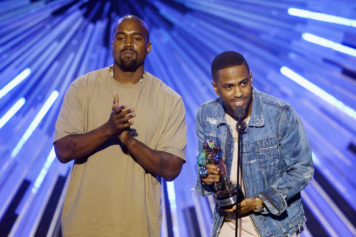
via abovethelaw.com
Days after releasing his No. 1 album, “I Decided” last month, Big Sean went on the “Breakfast Club” to open up about his most personal album to date. On this morning, co-host and serial offender Charlamagne tha God’s usual gambit of feckless taunts masquerading as questions was nowhere to be seen. Instead, the radio personality chose to keep the interview tethered to the themes sprinkled throughout the album’s rich track list.
Charlamagne: “In ‘Voices in My Head,’ you say, ‘Maybe a gunshot to the head would set all these thoughts free.’ You had suicidal thoughts at one point?”
Sean: “Yeah.”
Charlamagne: “What?! You’re one of the happiest people I know!”
Sean: “That don’t mean you ain’t got [problems]. … I go through real s— all the time. I’m not saying I was going to do it. I’m saying I thought about it. … God got me through that point. My family got me through that point. Unconditional love is more important than anything. That’s something money can’t buy.”
Through his music, Big Sean brings to light some of the hidden struggles of high-functioning depressives by carving out space to be fragile in a way not often allotted to Black men. Mental health writer and critic Imade Nibokun, whose research focuses on Black depression, notes that Black men are not allowed to be fragile because fragility privilege is reserved for white women in service to maintaining white supremacy. She tells Atlanta Black Star, “It is truly radical for a Black man like Big Sean to reveal the tension of navigating multiple identities and centering his mental health.”
On the track, Sean documents battles with himself, inner struggles with depression and the sometimes debilitating insecurities that come along with being a high-achieving person. “Voices in my head attacking what I’m thinking,” he raps. “Bullet to the head might be the way to free it.” As Sean raps, the voices in his head that promote doubt and discouragement can be heard in the background. For depressed folks listening, their doubts become his. Like him, they have internalized those same debilitating thoughts. “You’re a f—–g disappointment!” “You always do the same s—!” “You know better! What the f—?!”
In cognitive behavioral therapy, these ideas are called “negative automatic thoughts” and therapist often spend time with depressed people enabling them with tools to subvert and challenge those thoughts. The stream of thoughts are negatively framed interpretations of what depressed folk think is happening to them. As they did with Sean, the thoughts negatively impact one’s mood and feelings.
Sean’s response to his mental health struggles — turning to God, leaning on family but omitting mental health therapy — is part of a legacy of “toughing it out” that runs deep into the DNA of the Black community. It mirrors the ways in which Black men have come to cope with anxiety, depression or substance abuse disorders. According to a decade-long study and public education campaign called Real Men Real Depression, when it comes to depression and symptoms such as suicidal thoughts, Black men continue to seek mental health treatment at very low rates despite having the “highest all-cause mortality rates of any racial/ethnic group in the United States.” When they do seek help for their mental health issues, Black men almost exclusively consult with family members or faith leaders because of a longstanding mistrust of frontline health care providers.
The National Institute of Mental Health, organizers of the Real Men, Real Depression campaign, say that despite having a slightly lower prevalence of lifetime major depressive disorder (MDD) when compared to whites, Black folk have “depressive episodes that are more disabling, more persistent and more resistant to treatment.” This means that when depression hits Black people, it is more likely to manifest itself in severe, debilitating forms.

Big Sean “I Decided” album cover.
Charlamagne’s disbelief that someone as happy and accomplished as Big Sean could experience depression or have suicidal thoughts speaks to the disconnection between superficial displays of happiness and ongoing inner angst. Nibokun believes that there needs to be a redefinition of what high functioning looks like.
“We live in a society that boasts about being high-functioning, but in some ways, what people boast about is being isolated,” Nibokun says. “So many of us accomplish a wide variety of tasks without the support of others.”
For Black men dealing with ongoing mental health misdiagnosis, misunderstood behaviors and undetected symptoms can have fatal consequences. In general, men die from suicide three to five times more often than women and lack of use of mental health resources is a contributing factor.
The fabric of traditional masculinity that blankets the nation is knitted with a layer of gender norms that encourages men to endure illness as long as it lasts. When treatment for MDD is scrutinized along gender lines, the institute’s data show that men of all ethnicities have low rates of mental health utilization and are up to four times as likely to complete suicide. This may be a matter of traditional masculinity norms tamping down on men seeking help for depression, but the phenomenon also is impacted by what researchers call “male depressive syndrome” or the ways in which men cope with and express symptoms of depression. Studies have shown that depressed men are more likely to lash out in anger, express abusive behavior and engage in external coping mechanisms like overworking or drug abuse. Because these behaviors are often some of the most socially acceptable forms of expression from men, it often is misdiagnosed or under detected.
“Voices In My Head” is a battle between Big Sean’s negative automatic thoughts and his internal motivation to achieve in isolation. Nibokun says that the track exposes the Black church framework — the institution Black folks turn to for mental health more than any other entity — that says mental illness should be addressed privately in the prayer closet.
“I hope that as Big Sean exposes more of his vulnerability,” she says, “that we incorporate mental health professionals into the conversation so that our mental health lives are not a solitary journey.”


